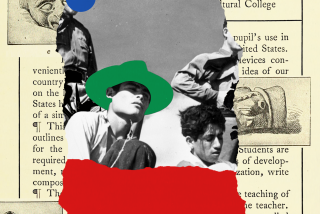Just tell the story
- Share via
EVER since Gordon S. Wood’s “The Creation of the American Republic, 1776-1787” was published in 1969 -- and won the prestigious Bancroft Prize -- his books have epitomized the best in American historiography. His pitch-perfect erudition is legendary. Wood’s superb 1991 book, “The Radicalism of the American Revolution,” won the Pulitzer Prize. The Brown University historian is now the go-to scholar on the American Revolution, the Federalist Papers, the U.S. Constitution and the Jeffersonian era. When Wood -- impeccable in his academic scholarship, never overstating an idea or padding an anecdote -- publishes, other historians pay attention. And in his sixth book, “The Purpose of the Past,” he makes it abundantly clear that postmodern historical scholarship is far too self-referential. A solid work of history, he argues, shouldn’t tell readers “more about the historian than the events he or she is presumably recounting.”
“The Purpose of the Past” is a fine collection of Wood’s best long-form book reviews from the New York Review of Books and the New Republic. It begins with a meditation on Garry Wills’ extraordinary “Explaining America” (1981) and ends with a dissection of Robin L. Einhorn’s pioneering “American Taxation, American Slavery” (2006). But Wood has added an afterword, a careful analysis of the long-term significance of each book through the lens of hindsight. You might say he is, in essence, reviewing his own reviews.
Frequently in “The Purpose of the Past,” Wood sings the praises of historians he admires (Charles Royster, “The Fabulous History of the Dismal Swamp Company”; David Hackett Fischer, “Albion’s Seed”). But Wood is not a puff-job specialist: Relishing his self-anointed role as arbiter of what constitutes real history, he denigrates the work of such notable practitioners of history as Simon Schama, John Patrick Diggins and Richard K. Matthews. And while he touts the virtues of political history, he also warns against letting modern political views infect the work he loves so dearly. “I am reminded of Rebecca West’s wise observation that when politics comes in the door, truth flies out the window. Historians who want to influence politics with their history writing have missed the point of the craft; they ought to run for office.”
In the 1960s, a new interpretive trend swept the history profession. Storytelling was frowned on in favor of theories. History was valued more as a science than as part of the humanities. Writing about dead white presidents or elitist institutions, for example, was dismissed as old school. This trend snowballed in the 1980s. The cultural and social historians of the Reagan era claimed that military or political history was passe, that the postmodern current of the times dictated that real masters embrace such concepts as “deconstruction,” “textuality” and “essentialism.” Energized by the holy trinity of race, class and gender studies, academics shunned so-called triumphalist U.S. history. “Present-day graduate students of history are well aware that ‘race, class, gender’ is the mantra they must repeat as they proceed through their studies and write their dissertations,” Wood laments, adding, “A female historian who wanted to study the eighteenth century founders told me that she was criticized by other female scholars for wasting her time working on those ‘dead, white males.’ ”
Spurred by technological advances in the 1980s, postmodern historians started compiling quantitative data on everything from disease rates to census analysis. This social science trend has been good for the history profession -- to a degree. The problem, Wood argues, is that such hyper-specialization turns off the general public. “Several indices revealed that the American people were becoming less and less interested in the kind of social history academics were teaching and writing,” he notes, adding that at a time when enrollment in higher education was booming from 1970 to 1986, “the number of history degrees granted by all American colleges and universities declined almost by two-thirds.”
Besides boring students, another casualty of this dismissive attitude toward narrative history is that few academic historians are widely read, according to Wood, leaving the field to such writers as Ron Chernow, Walter Isaacson and David McCullough. Paradoxically, the practitioners of the new cultural history -- scholars of such “people’s issues” as prostitutes’ rights and existential angst in factory workers -- deliberately write books accessible only to other tenured professors, which “is too bad,” he writes, “since history is an endeavor that needs a wide readership to justify itself.”
Like a referee blowing a whistle, Wood calls for a timeout, to pause and reflect on the condition of modern historiography. (You might think of Wood as a pendulum, stopping in mid-swing to offer up pearls of modest wisdom.) The core argument he presents is that the incendiary warfare between the popularizers and academics must stop. Whether it’s a bestselling Albert Einstein biography published by Simon & Schuster or an esoteric university press case study on the Watts riots using deconstructionist Jacques Derrida and structuralist Michel Foucault as gurus, the historian’s mission should be the same: to communicate the past to everyday people. To Wood, an audience is essential if historians are going to influence the consciousness of our times. “We Americans have such a thin and meager sense of history that we cannot get too much of it,” he writes. “What we need more than anything is a deeper and fuller sense of the historical process, a sense of where we have come from and how we have become what we are.”
At times, “The Purpose of the Past” is dull. Too often Wood is stuffy, quoting Nietzsche and telling readers why De Tocqueville is relevant. Nevertheless, readers uninterested in the petty squabbling within the historical profession still can enjoy these illuminating essays for a singular reason -- they’re extremely well written. Robert B. Silvers, editor of the New York Review of Books, emerges as the real hero of this collection. Since the 1980s, Silvers has given Wood the space to write lengthy essays. Instead of merely promoting narrative history, Wood, for example, looks at Robert Middlekauff’s “The Glorious Cause” (1982) with an eye to what its very publication says about an old-fashioned multivolume series in the age of postmodernism.
Somehow the feeling one gets from Wood is that the entire historical profession should follow the lead of Ivy League schools circa 1980. There is a private-club feel to his prose. Around every bend, Wood grumpily laments the over-specialization of the profession. He champions historians who haven’t earned advanced degrees (McCullough, Barbara W. Tuchman and Stacy Schiff, among others). His populism is grudging but real. “As the most popular historian of her generation, Tuchman satisfied the hunger for good old-fashioned narrative history for millions of readers, just as McCullough has done for our generation.”
Yet Wood goes on to deem “The March of Folly,” Tuchman’s 1984 book tracing war from the time of Troy to Vietnam, “misbegotten” because she was force-feeding the notion that history has “usefulness.” In fact, any book that offers even a whiff of spin gets stamped out by Wood in “The Purpose of the Past.”
Wood is able to pontificate on the uses of history in America because he is such a fine craftsman himself. Most scholars trying to garner a five-figure publishing advance or scratch out a living at a state university might find Wood’s value system too precious and obsolete. In reality, historians are just past-thinking people trying to raise families and pay bills. But it’s good to know that Wood is out there as our watchdog, assessing long-term shifts in our profession and hoping that our guild’s readership continues to grow.
More to Read
Sign up for our Book Club newsletter
Get the latest news, events and more from the Los Angeles Times Book Club, and help us get L.A. reading and talking.
You may occasionally receive promotional content from the Los Angeles Times.










